#barnaby rudge (book)
Explore tagged Tumblr posts
Text
The shadows of our own desires stand between us and our better angels, and thus their brightness is eclipsed.
—Charles Dickens, Barnaby Rudge
24 notes
·
View notes
Text
Choosing Our Next Novel

People of tumblr! I may also send out an email about this, but I just want to gauge initial thoughts for our next novel. The below is every work that would start in April or earlier. It’s probably too short notice to start Martin Chuzzlewit, but there are several other options.
Jan 2025 - July 2026 (1 year and a half) - Martin Chuzzlewit Mar 2025 - Sep 2026 (1 year and a half) - Nicholas Nickleby Mar 2025 - Sep 2026 (1 year and a half) - Bleak House Apr 2025 - Nov 2026 (1 year and a half) - The Pickwick Papers Apr 2025 - Feb 2026 (11 months) - The Old Curiosity Shop Apr 2025 - Aug 2025 (5 months) - Hard Times Apr 2025 - Nov 2025 (8 months) - A Tale of Two Cities Apr 2025 - Sep 2025 (6 months, but unfinished) - Edwin Drood
When I’ve run polls in the past, all the most successful options have been books that run for under a year. The only Dickens novels left that were serialised over the course of less than a year are the bolded ones above. Not including the unfinished The Mystery of Edwin Drood, there is a way to plan well in advance to minimise gaps and favour shorter-running works (so we read The Old Curiosity Shop Apr 2025 - Feb 2026, then A Tale of Two Cities Apr 2026 - Nov 2026, then Hard Times Apr 2027 - Aug 2027).
Does this appeal to people as an option? Or does such far-advanced planning seem overkill? And would it be better to keep some of the shorter ones for further down the line? Should we have another vote to allow for the possibility of a longer work winning this time? Help me make up my mind about this!
Thank you in advance for voting or letting me know your thoughts, and thank you to everyone who has joined in so far with Great Expectations and Barnaby Rudge!
#charles dickens#dickens#dickens daily#tumblr book club#personally I would love to do one serialised over a longer period of time but I don’t know if the people also yearn for this#feel free to vote and/or comment whether you’ve taken part previously or not#The Pickwick Papers#Nicholas Nickleby#The Old Curiosity Shop#Martin Chuzzlewit#Bleak House#Hard Times#A Tale of Two Cities#The Mystery of Edwin Drood#Barnaby Rudge#admin#I meant to get this out quickly after Barnaby Rudge finished so apologies for the delay#and therefore the removal of Martin Chuzzlewit as an option#there was a lot happening#(getting ill; graduating; my cat getting ill; my friend moving house; some gigs; Christmas; new year)#but here's to 2025 and more Dickens to be read!
11 notes
·
View notes
Text
There's a very cinematic quality to the writing of the attack on Newgate... A lot of big picture description of the fire and the mob as a whole, interspersed with evocative imagery of details - the blistering of the roof lead, the staggering of the chimneys in the flickering light - and checking in with individuals within the scene... we seem to sort of soar over the prison wall along with the firebrands to see the reactions of the people inside...
6 notes
·
View notes
Text
The shadows of our own desires stand between us and our better angels, and thus their brightness is eclipse.
-Barnaby Rudge
6 notes
·
View notes
Quote
But, the absence of the soul is far more terrible in a living man than in a dead one.
Barnaby Rudge, Charles Dickens
#barnaby rudge#charles dickens#classics#literature#english literature#classic literature#classic books#quotes#book quotes#books#bookblr
12 notes
·
View notes
Text
0 notes
Text
What your favourite Dickens novel says about you:
(bear in mind, most of these are severely vibes-based)
The Pickwick Papers: You're most likely gay and have a close group of friends. Your favourite hobby is prank calling your local pizza place. You miss Vine.
Oliver Twist: This is the only Dickens novel you've read or you just really like the musical. You feel extremely sorry for Nancy. You're really attached to your pet(s).
Nicholas Nickleby: You have a strong sense of justice. You either have a travel blog or want to have one. Despite everything you believe that people are fundamentally good.
The Old Curiosity Shop: You're the oldest sibling. You're interested in lost media because you're hoping to find that one cartoon that scarred you as a child. You believe that things aren't what they used to be.
Barnaby Rudge: You've watched at least one major 90s sitcom in its entirety. You love gossip. You call yourself "a little gremlin" unironically.
Martin Chuzzlewit: Oh wow, you exist? Good for you, good for you... You like nature and I mean REALLY like it. You're a completionist. You love Tom Pinch with all your heart.
Dombey and Son: You have daddy issues (duh). You're very lonely but too proud to admit it. You love gothic literature and movies about creepy children.
David Copperfield: You relate to Aunt Betsey an ungodly amount. You like listening to podcasts and imagining that the hosts are talking directly to you. You just love life, man, and all that it has to offer.
Bleak House: You're academically gifted. You know how to knit/crochet/cross stitch/all of the above. In every social situation you're the "mom friend".
Hard Times: You're not like the other girls. You had a steampunk phase. You like to read about famous shipwrecks in your spare time.
Little Dorrit: You love Downton Abbey and/or The Gilded Age. You prefer Jane Bennett to Lizzie. You are on good terms with your parents.
A Tale of Two Cities: You're a centrist. Biopic is your favourite genre of film. You don't like going to concerts because they are too loud.
Great Expectations: There's a good chance you've read this because of South Park. You think Estella deserved better (and you're right). You read a lot of fanfiction.
Our Mutual Friend: You like your characters to be actual characters and not caricatures. You call tell a Cabernet from a Merlot. You have many dating horror stories.
The Mystery of Edwin Drood: You've been on at least one ghost tour. You dislike BBC's Sherlock because it is unfaithful to the books. You strongly considered going to mortuary school at some point.
#charles dickens#the pickwick papers#oliver twist#nicholas nickleby#the old curiosity shop#barnaby rudge#martin chuzzlewit#dombey and son#david copperfield#bleak house#hard times#little dorrit#a tale of two cities#great expectations#our mutual friend#the mystery of edwin drood
31 notes
·
View notes
Text


Grip was a talking raven kept as a pet by Charles Dickens. She was the basis for a character of the same name in Dickens's 1841 novel Barnaby Rudge and is generally considered to have inspired the bird from Edgar Allan Poe's 1845 poem "The Raven.”
You can see her (stuffed) in the Rare Book department at the main branch of the Philadelphia Library on Vine St.
48 notes
·
View notes
Text
The Many Illustrators of A Tale of Two Cities 6: Max Cowper
...& some frustration from faulty sources...
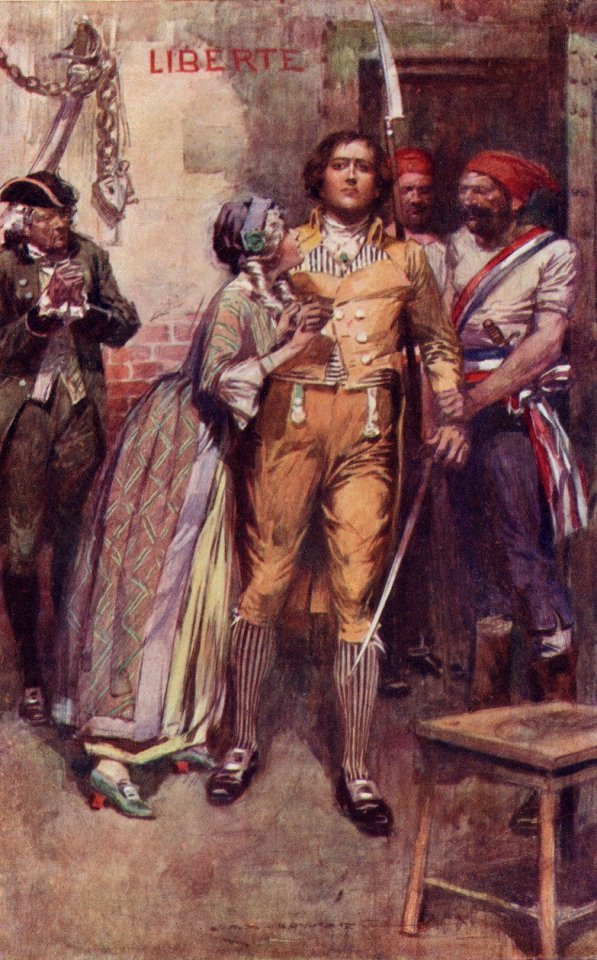
"Lucy (sic) Bids Farewell to Sydney Carton"
As we've come to see here, not all sources for these many illustrations are, put simply, all that great or reliable.
To start off, the ↑ above illustration is excellent example: A) Obviously, the name of this illustration doesn't match up with any scene in A Tale of Two Cities! My guess is that it's actually depicting Charles being taken away in "Dusk" (pretty major thing to get wrong!). Multiple online sources cite this as the name, but is that really what Max Cowper himself named it? B) I honestly didn't know until recently that this was, in fact, by Max Cowper! I've had this illustration stored in the archives for years and was only able to confirm it by - you guessed it - looking at that faint signature below the main character's feet and checking it off another color illustration by him (poetically, for Barnaby Rudge).


This is something that happens often in my research: Many illustrators for this novel will have a one-off piece not necessarily related to the work they did for the novel itself, and it's usually much more difficult to connect that piece to their book illustrations (when we get to Fred Barnard eventually...oof!). Oftentimes, the image just gets passed around over decades of republication - sometimes even traced / redrawn - and used as a cover or frontispiece without credit.
There are other forms of unreliability, though - including one I just encountered for the first time: Here are Cowper's eight 1902* illustrations for the novel. One of these is not like the others - see if you can tell which!
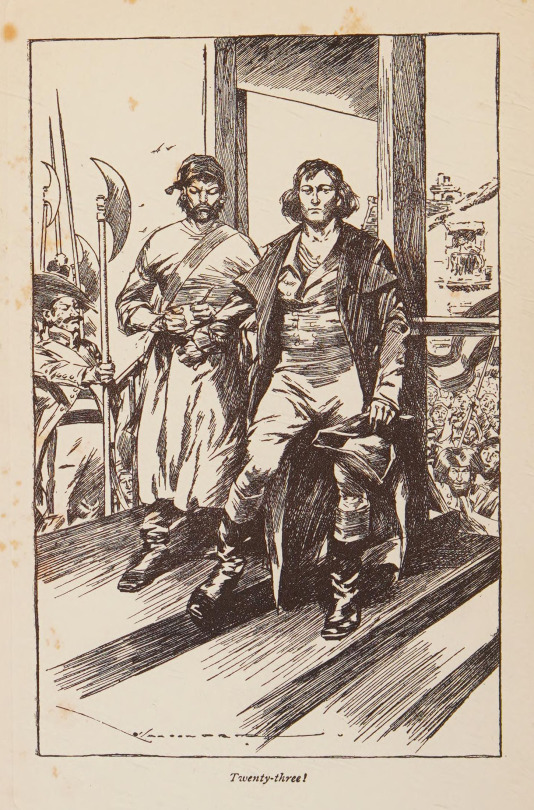
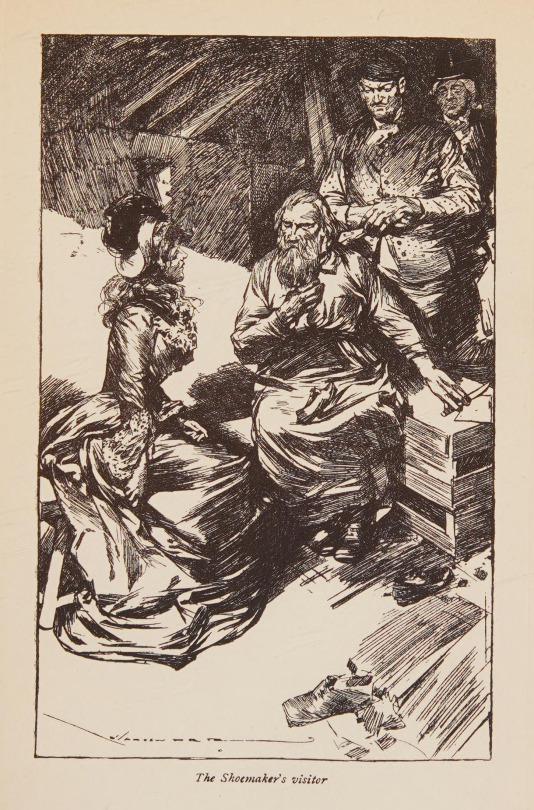
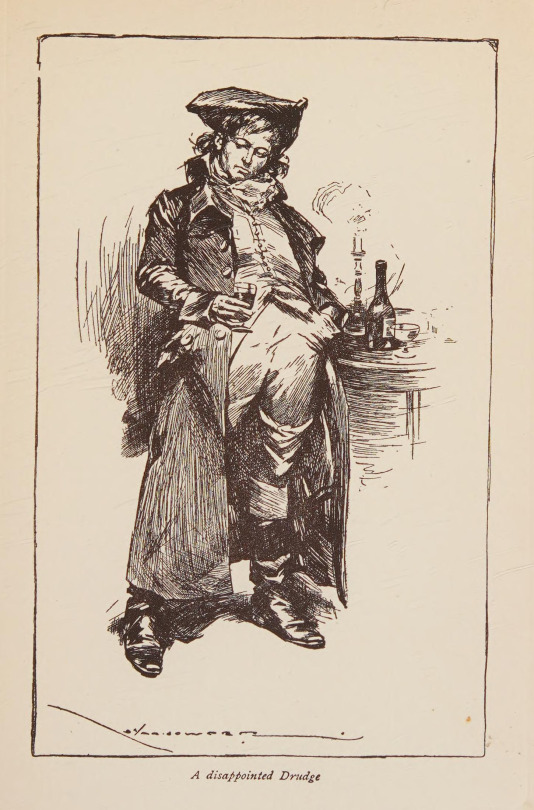
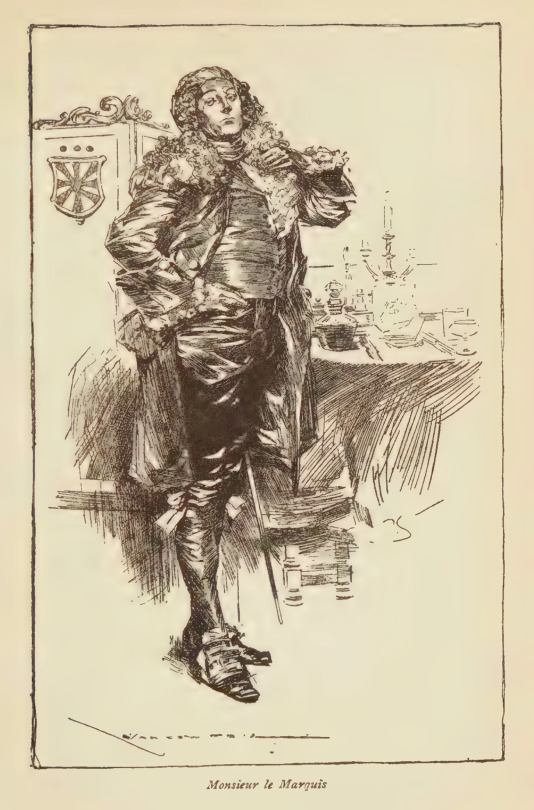
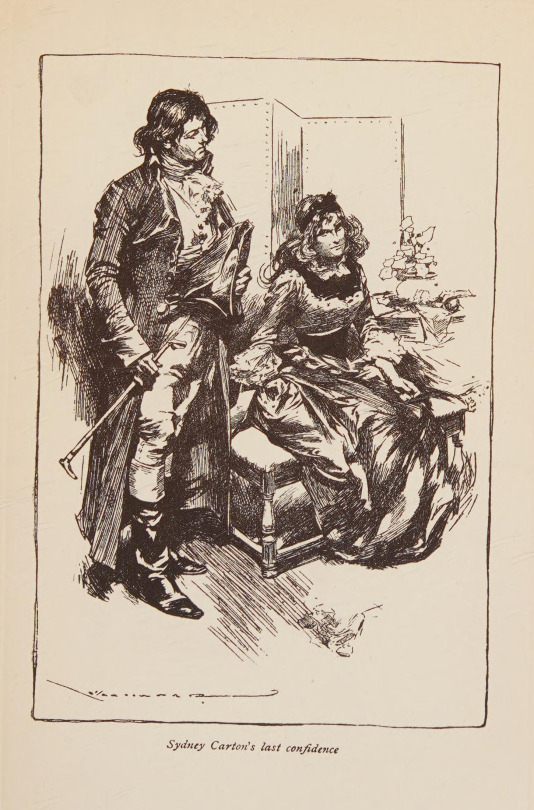
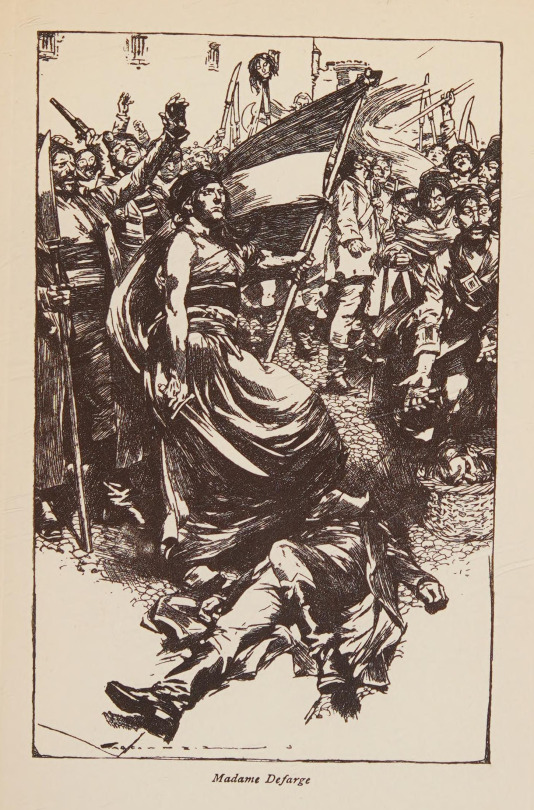
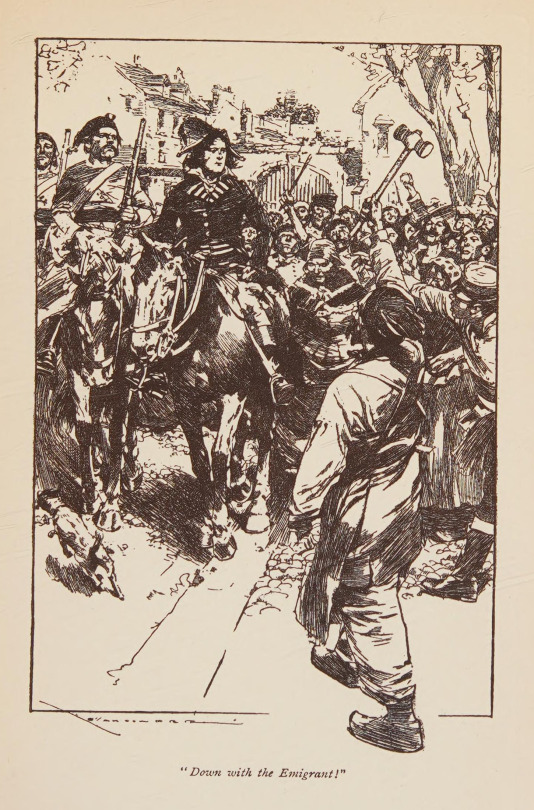
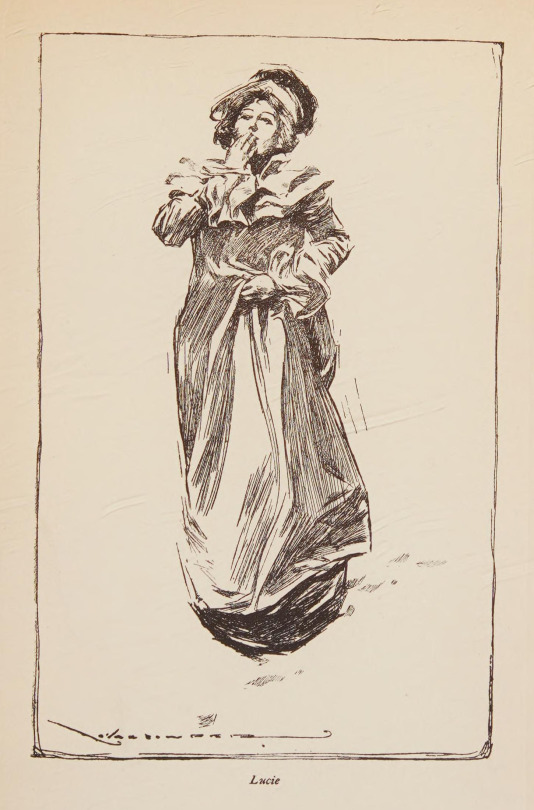
If you guessed the fourth ("Monsieur le Marquis"), you'd be correct!
Basically, when I originally downloaded this set from the Internet Archive, I hadn't downloaded them as individual images but rather the entire book as a PDF which I then picked the images off of - and what I hadn't realized until recently was that this compresses the images in a strange way.
Here is what the PDF compression looks like:
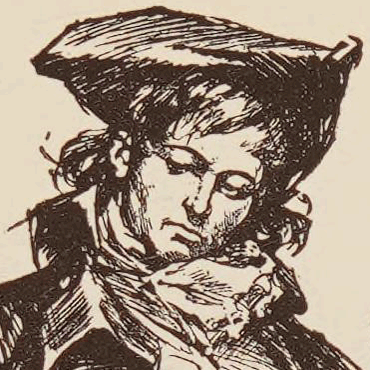
See how much beautiful linework and detail gets crunched?
And so, today, to make this post, I went out to that source again and downloaded each individually - only to find that this exact source no longer had the Marquis illustration! Basically, I think that someone working at the Internet Archive rescanned the exact same copy of the book - accidentally skipping one of the illustrations in the process - and then replaced the old scan with this new (honestly really nice) one. Human error strikes again, both on my part and on theirs!
Ultimately, I decided not to try to find these from any other source and to just include the one with the compression error that doesn't quite match the quality of the rest - which will tie in well with the next edition of this series anyway (you'll see)!
And regardless, I'm grateful we have access to these beautiful, humanistic character designs and illustrations at all, no matter the image quality🖼️
*To round it all out, the copy from which I downloaded these is from 1904, but I also read a source that said the first version of this edition was maybe from 1902, so, once again, ¯\_(ツ)_/¯
& the standard endnote for all posts in this series:
This post is intended to act as the start of a forum on the given illustrator, so if anyone has anything to add - requests to see certain drawings in higher definition (since Tumblr compresses images), corrections to factual errors, sources for better-quality versions of the illustrations, further reading, fun facts, any questions, or just general commentary - simply do so on this post, be it in a comment/tags or the replies!💫
#A Tale of Two Cities#AToTC#dickens#charles dickens#literature#classic literature#victorian literature#vintage illustration#illustration#illustrators#Max Cowper#1900s#obviously I have a favorite here#and god as much as i'm irritated that that happened with one of these so that it isn't a 'perfect' set#i'm. glad it's the marquis one. like whatever#(and also like I said it'll tie in with the next post in this series because there's a similar error in that one too)#for real though the more I look at Cowper's work the more I appreciate it. this is someone who cared about the work. you can feel it
13 notes
·
View notes
Text
updated list that i keep forgetting to do for 2023 (i was a lot better at pacing these out this past year lol):
great expectations
hard times
little dorrit (i REALLY loved the supporting cast for this one. flora my beloved <3)
the old curiosity shop (no idea how this ended up so high especially since little nell embodies a fair bit of what i dislike about dickens' characterisation of women. but there you go!)
bleak house
edwin drood (realistically i couldn't justify putting it higher than this because it doesn't exist in full. the satire of social campaigners is infuriating and reactionary but the explicit engagement with race, which dickens so often uses as a metaphor for his white characters, is new and fascinating and makes me sad this book wasn't completed. helena landless i would die and kill for you)
nicholas nickleby
a christmas carol (and etc)
martin chuzzlewit
david copperfield
dombey and son (real talk i'm not 100% on the positioning of this one. one i like a lot but don't love, and it made me realise fully how often dickens relies on Quiet Uncomplaining Suffering to generate pathos for his characters....i would like more of his women to be allowed to be angry at their treatment!)
a tale of two cities (dickens is an excellent storyteller which sells this. i'm not keen on the mob stuff and i don't care about our two virtuous leads. possibly suffers from being the ur-example from which all french revolution fiction derives in its focus on the terror and revolution-as-mindless-destruction)
oliver twist
the pickwick papers (didn't dislike this one, just think it does a lot of things that later dickenses do more interestingly)
i had this grand plan last year to read 6 dickens books (outside of great expectations, which i read for uni) with the expectation that i’d get some done in the summer, and this experience would be spread out…actually what happened is i read david copperfield, NOTHING else until october, and then crammed the rest in from the tail end of that month. anyway just as a personal record this is my current Grand And Objectively True ranking of what i’ve read so far
great expectations
hard times
bleak house
nicholas nickleby
a christmas carol (and other christmas writings; i read the penguin edition, which mainly has snippets from longer works but also includes the haunted man)
martin chuzzlewit
david copperfield
oliver twist
(to be clear i don’t hate any of these; oliver twist was my lowest rating at 3.5)
#laura talks books#charles dickens#i'm reading barnaby rudge rn. think it's gonna end up near the bottom of this list but i'm still enjoying it
3 notes
·
View notes
Text
I'm not done with it yet (9 more chapters!!) but tbh Barnaby Rudge should be more popular. It's a pretty good & interesting book but so few people (even Dickens fans) talk about it
7 notes
·
View notes
Text
There's still time...
There's still time to sign up for our second novel, Barnaby Rudge!
If you enjoy the installments of Dracula Daily, why not try Dickens Daily? We serialise the works of Charles Dickens at the same pace as they were originally published, so you'll get to find out how the Victorians felt waiting for the next chapter!
Our next novel will start going out on the 13th of February 2024 and last until November! Read on below to learn more about the book and to sign up.

Set against the backdrop of the Gordon Riots of 1780, Barnaby Rudge is a story of mystery and suspense which begins with an unsolved double murder and goes on to involve conspiracy, blackmail, abduction and retribution. Through the course of the novel fathers and sons become opposed, apprentices plot against their masters and anti-Catholic mobs rampage through the streets. With its dramatic descriptions of public violence and private horror, its strange secrets and ghostly doublings, Barnaby Rudge is a powerful, disturbing blend of historical realism and Gothic melodrama.
10 notes
·
View notes
Text
The fourth of several posts about illustrations (of the 1780 section) of Charles Dickens's Barnaby Rudge.
'The Golden Key' locksmith's (The Varden Residence), Clerkenwell, London
Characters featured: Gabriel Varden (resident), Mrs Varden (resident), Miggs (resident), Sim Tappertit (resident), Dolly Varden, Joe Willet, Edward Chester, Mr Haredale, Emma Haredale, Miggs's nephew, various rioters
Chapters featured: 41, 51, 63, 79, 80
Illustrators featured: Phiz (Hablot Knight Browne), Fred Barnard, A. H. Buckland, Harry Furniss
The Locksmith at work

By Fred Barnard (1874) for the beginning of chapter 41:
From the workshop of the Golden Key, there issued forth a tinkling sound, so merry and good-humoured, that it suggested the idea of some one working blithely, and made quite pleasant music. No man who hammered on at a dull monotonous duty, could have brought such cheerful notes from steel and iron; none but a chirping, healthy, honest-hearted fellow, who made the best of everything, and felt kindly towards everybody, could have done it for an instant.
Dressing for Defence


Left: Harry Furniss (1910); Right: Phiz (1841); both for chapter 41.
Dolly and Miggs help Mr Varden dress in his Royal East London Volunteers uniform. I believe the Royal East London Volunteers themselves were fictional, but were based on real volunteer regiments who were formed to provide a sort of 'home guard' function and last defence in the event of invasion. In this case (and, indeed, most cases in British eighteenth and nineteenth century literature where characters join volunteer regiments) volunteers were sought due to fear of invasion from the French.
This scene of Mr Varden dressing in his uniform may seem a little unnecessary, given the fact that Mr Varden's position in the volunteers is never relevant in the story again, but I think the point is to remind readers of the international tensions which influence the national tensions in the novel. The second half of Barnaby Rudge is set in 1780, during the Anglo-French war of 1778-1783, and the American Revolutionary War / the American War of Independence. The fact that Britain was at war, and especially that they were at war with the French (a largely Catholic country), is important background to the Gordon Riots.
(This part of Barnaby Rudge is, of course, concurrent or near-concurrent with the 1780 section of A Tale of Two Cities, where Anglo-French tensions are even more relevant.)
Other Indoor Scenes at The Golden Key


Left: A. H. Buckland (1900) for chapter 41 showing Dolly and Miggs; Right: Phiz (1841) for chapter 79 showing the scene between Edward Chester, Emma Haredale, and Mr Haredale;


Left: Fred Barnard (1974) for chapter 51 when Sim returns drunk to The Golden Key at the end of one of the first nights of rioting; Right: Phiz (1841) for chapter 80, when Miggs attempts to return to The Golden Key and the Varden family, following the end of the riots and her earlier betrayal when she disabled Mr Varden's gun and therefore left him unable to defend the house from rioters...
Outside The Golden Key

By Fred Barnard (1874) for chapter 63, when the rioters are attacking The Golden Key. Gabriel Varden and Miggs are visible at the windows, and Hugh, Dennis, and Sim are recognisable in the crowd.
#i am still planning to finish these posts...#😅#illustration#barnaby rudge#barnaby rudge (book)#dickens daily#barnaby rudge; a tale of the riots of 'eighty
3 notes
·
View notes
Text
Here is Edgar Allan Poe "reviewing" a Charles Dickens novel you have never heard of, in 1841.
I assume the word "review" meant something very different back then, because he basically just summarizes the entire plot, with spoilers, and gets into some arcane analysis of what Dickens intended vs. what Poe as a reader got out of it, and why they're different...?
This reads like a really long Reddit post by someone who just started feeling whatever they took 20 minutes ago and forgot what they were doing. He sort of judges how effective the book is at being gothic and creepy?, except they didn't have our modern frame of reference for all that, so it's very confusing.
Plus this was an era where there was no concept of a run-on sentence, and mid-sentence punctuation was more a fun new idea than a rule.
You try it. I barely understand what the hell he's talking about for most of it. Except the part right at the end where he complains about the illustrations.
1 note
·
View note
Quote
[...] when I talk of eyes, the stars come out! Whose eyes are they? If they are angels’ eyes, why do they look down here and see good men hurt, and only wink and sparkle all the night?
Barnaby Rudge, Charles Dickens,
#barnaby rudge#charles dickens#english literature#classic literature#literature#quotes#book quotes#classics#classic books
2 notes
·
View notes
Note
Sadly, Literary Letters seems to have stopped, at least temporarily. I've just been reading the relevant entries on the appropriate dates on my own, but there've been a couple months of silence now. But I can add on a few more fiction substack recs for you:
Beyond the Wizard for all the Oz books. We're a ways in but they're quick easy reads, and quite whimsical.
There's also Letters From Little Women - a few months in now but only about seven chapters actual book I think.
Tagore Tales for new translation of Tagore's work. Mostly short stories up till now, but I believe we're getting a look at a book next.
Public Domain Book Club is similar to Literary Letters in that it picks different older books without sticking to one author/book. I've just joined and it seems to be a book a month or so, not epistolary or tied to actual dates.
Dickens Daily is going through various Dickens novels, according to when they were originally serialized. Currently a chunk of the way through Barnaby Rudge.
What other novels to your inbox do you recommend? I have done Dracula Daily for years and I want to expand my horizon. War is pretty much the only thing that I don't like. Thanks
Hi!
So funny story, contrary to my username and bio…I have not been keeping up with the classic novels in my emails lately. BUT. That does not mean I don’t have some recommendations for you!
Also, since you did mention you don’t like war, I made sure not to recommend any novels that heavily involve war (War & Peace & Emails, for instance). However, I do know some characters in these recommendations have history with war (e.g. Watson was a war doctor) and I’ve made sure to make mention of that wherever possible. So, I apologize if that comes off as annoying or stating the obvious, I just want you to be fully informed before you read. I’m also listing general content warnings as a rule to inform anyone who might be interested in these Substacks. :)
On to the recommendations!
If you’re looking for mystery…
Learn about the greatest detective of all time from his faithful partner — that’s right! Read Letters from Watson to get the scoop on Sherlock and solve mysteries alongside the legendary duo. I thought this was such a cool concept and I wish I had been able to keep up with it. But it was very fun for the time I did. It goes through the entire chronology of Sherlock stories (which is a lot, by the way) and they just started going through the “more complex cases” (aka, the 4 Sherlock novels) back in January. So, it might be a good time to start! There isn’t war in these cases (at least as far as I know, each email does have a list of content warnings for specifics), but Watson was a war doctor and this does come up frequently, just as a heads up.
If you’re looking for epistolary stories…
Literary Letters takes obscure epistolary novels from the public domain and puts them into your inbox! Right now they’re reading The Sorrows of Young Werther, which is about a guy who’s in love with a girl who’s betrothed to another and writes very passionate letters on the subject.
For a content warning, I’ve included the publisher’s note on this one: “There are passages where the book discusses Werther’s depression, despair, rationalizations for suicide, and the suicide itself at length, so please take whatever precautions you need to read the book safely, which may include buddy reading, mental health breaks, or skipping it altogether.”
So with that being said, the reason I got into this email chain was actually for their first novel they emailed - The Lightning Conductor. I absolutely loved this novel and I heavily recommend going back into the archives to read it and its sequel if you can (that one is in the “Side Stories” archive). It’s a very lighthearted read and a romance, told in epistolary format! Basically, it’s about this smart (yet a bit scatterbrained — not judging, because, same) woman who goes to Europe for the first time and she ends up meeting a gentleman when her car breaks down. Said gentleman is mistaken for a chauffeur and he goes along with it, just because she’s dreamy and he’s already smitten with her. Then there’s her “best guy friend” and her mom trying to throw a wrench in their plans. It’s utter chaos and I love it. I could go on for hours about this novel, but I won’t! I do highly recommended reading it if you ever get the chance.
If you’re looking for a read in verse format…
Check out Divine Comedy Weekly! It’s telling Dante’s Divine Comedy every Tuesday and Thursday. There’s not much to say about this one because I dropped out pretty early in the game, unfortunately. For some reason, stories told in a lyrical/verse format don’t seem to be my thing, but maybe they’re your thing! I think it’s a great concept and for that reason, I will recommend this.
If you’re looking for an all-new read…
North and South by Jane Austen is coming to your inbox this June! It’s apparently a bit like Pride and Prejudice but with the Industrial Revolution and labor relations. I actually just subscribed to this one and I’m excited to see how I enjoy it!
If you’re looking for a long haul read…
Buckle in! It’s time for Whale Weekly! That’s right, you’re in for a THREE YEAR TRIP with this bad boy because Ishmael is emailing you the tale of Moby Dick. Life has gotten in the way and I’ve fallen behind (though this is motivating me to catch up again), but this is actually really good as an email read because this guy goes on so many tangents, it’s more fun for me to absorb his thoughts in spaced out emails, rather than if I tried to read the book.
The memes are very fun with this one, but please keep in mind there is racism and foul language in this, as well as other heavy topics I can’t remember off the top of my head. Also, this does not take place in a war setting, but I do believe some characters have been in war in the past, so that is probably something to keep in mind with this one!
This one is coming to an end fairly soon (I didn’t realize we were on chapter 113/135 OOF), so I don’t know if they’re going to do another round after this or leave it. I imagine it would probably be hard to catch up at this point, but I’m going to link it anyway because I typed all of this up before realizing how far along we were and I do still recommend the read in email format rather than a novel format.
If you’re looking for horror…
I would recommend “The Beetle Weekly”. I wasn’t able to finish this one because LifeTM got in the way, but it is, for sure, one of the reads of all time. Probably the best and worst thing you could read ever tbh. It’s not very enjoyable and I’m not pitching it well at all, but for some reason, I am legitimately recommending this because it is hilarious to read with Tumblr memes by your side. As a heads up, this book does include racism, gore, sexism, transphobia (iirc?) and likely more content warnings I can’t remember. The reason I’m recommending it at all is because it does carry some of the same themes as Dracula and the characters are interesting. Plus, love it or hate it, I reacted while reading this book - a lot. Did I mention I have a bug phobia? Also, fun fact: it was published at the same time as Dracula and was actually MORE POPULAR than Dracula for a while before fading into obscurity.
The only thing is, it did just end last April so you might have to wait until December for it to crawl back into your inbox if you’re interested.
If you’re looking for a thriller…
Jekyll and Hyde Weekly. I absolutely LOVED THIS ONE!!!! Very much vibes of Dracula Daily. Immaculate stuff right there. This one has a lot more comedy than you’d think and was very enjoyable. Content warnings for violence against a child (mentioned, not shown), body horror, and there is one more I can’t say without spoiling the book (feel free to DM me if you’re interested in knowing).
Again, this is pretty short and it’s not currently active; it runs November through January, so that’s when you can look out for it!
I was hoping to recommend some more via a masterlist, I know someone made a post waaay back in 2022 when this serialized email novel thing first got started, but it looks like it got deleted, so if there is a new one, I would love for anyone to share it just for future reference!
I do have a couple of honorable mentions I’ll link that I haven’t read and know next to nothing about, but just so you can have even more recommendations. Please feel free to share your favorites!
#tumblr book club#leaving off nonfiction and ones that are nearly finished#i am (or was through one full run) subscribed to all of these and several more
39 notes
·
View notes